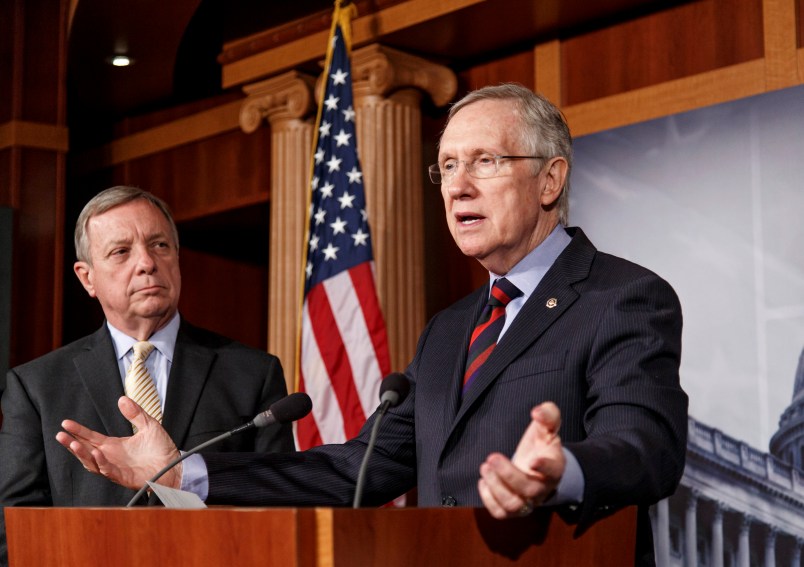After years of threats and warnings, Senate Majority Leader Harry Reid (D-NV) and his Democratic majority on Thursday executed the “nuclear option” to eliminate the filibuster for executive branch and judicial nominees, except for the Supreme Court.
Fifty-two Democrats voted to scrap the filibuster rule after Republicans again blocked cloture on the nomination of Patricia Millett to the D.C. Circuit Court of Appeals. Democratic Sens. Carl Levin (MI), Joe Manchin (WV) and Mark Pryor (AR) voted with Republicans to uphold the filibuster and avoid the rules change.
“Republicans have routinely used the filibuster to prevent President Obama from appointing his executive team or confirming judges,” Reid said on the Senate floor. “We’re burning wasted hours and wasted days between filibusters. I could say instead we’re burning wasted days and wasted weeks between filibusters. … It’s time to change. It’s time to change the Senate before this institution becomes obsolete.”
Reid invoked the swath of GOP filibusters of cabinet, sub-cabinet and judicial nominees, from Chuck Hagel and Mel Watt to executive positions and Obama’s three nominees to the powerful D.C. Circuit court — Millett, Nina Pillard and Robert Wilkins.
“Is the Senate working now? Can anyone say the Senate is working now?” the majority leader said before the vote. “I don’t think so.”
The “Reid Rule,” as supporters are calling it, does not affect the minority party’s ability to filibuster Supreme Court nominees or legislation.
Senate Minority Leader Mitch McConnell (R-KY) fumed at Reid’s decision, accusing him of trying to change the subject from Obamacare and “cook up some fake fight over judges.” He argued that “by any objective standard, Senate Republicans have been very, very fair to this president” when it comes to letting him appoint his nominees.
“I say to my friends on the other side of the aisle: you’ll regret this,” McConnell said. “And you may regret it a lot sooner than you think.”
Here’s how it happened. First Democrats called for a simple-majority vote to move to reconsider the failed Millett nomination, whicwas approved 57-40. Then McConnell scrambled to head off the coming rules change by calling for a motion to adjourn the Senate until 5 p.m on Thursday. That vote failed, 46-54. Then Democrats moved to advance the Millett nomination, which had to be at a 60-vote threshold, and Republicans filibustered her again, 57-43.
At that point, Reid took the historic step of raising a point of order that when the Senate votes on cloture again, the threshold should be at a simple majority. Under standing rules, the presiding officer ruled that motion out of order. Reid then appealed the ruling, and a majority of senators (52 — all Democrats) voted against upholding the filibuster. The vote was 48 to keep the filibuster, 52 to scrap it. That historic vote created a new precedent by which a simple majority may bypass cloture on nominations.
The presiding officer, Sen. Patrick Leahy (D-VT), made clear after the vote that the new precedent set does not apply to Supreme Court nominees.
McConnell then made an attempt to overturn the nuclear option vote, which failed 48-52.
Earlier this summer, during the previous filibuster fight that ended without a rules change, the Republican leader warned that if Reid ends the filibuster for nominations, he would end the filibuster for everything, including legislation, if he becomes majority leader.






